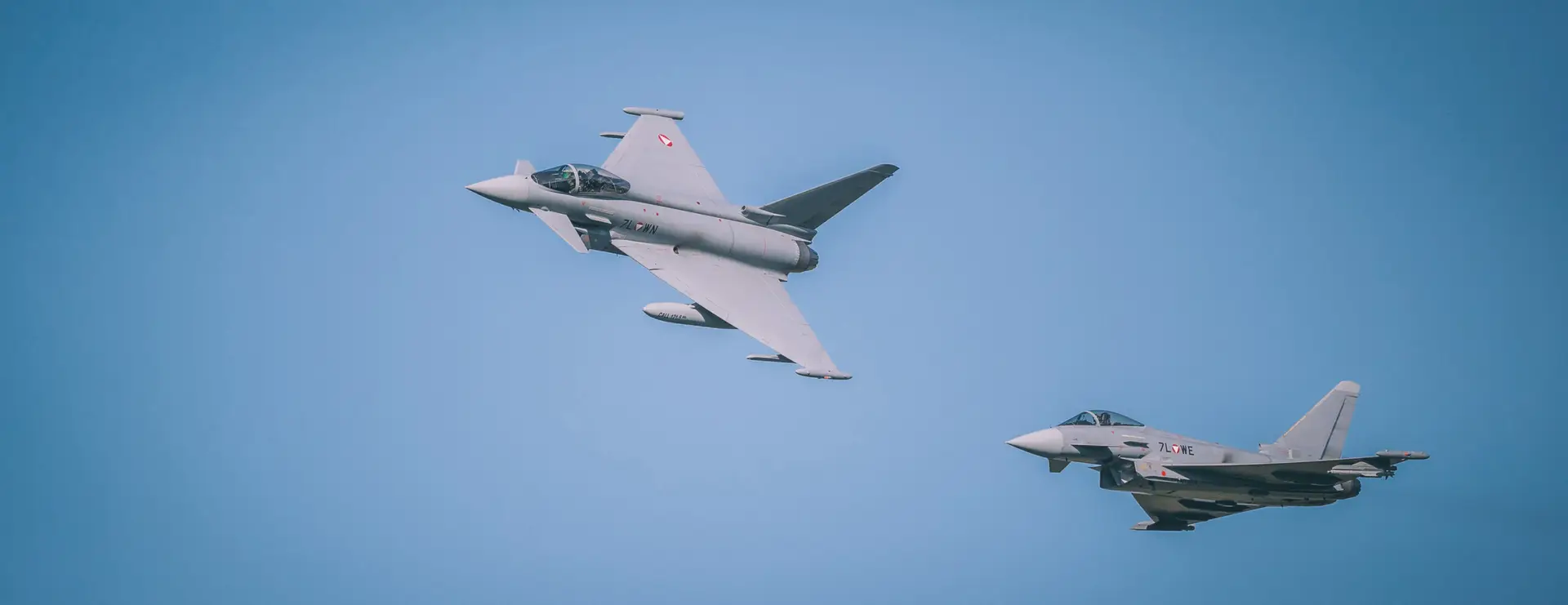Austrian aerospace companies are highly successful in the market with their high-tech products. An interview with Volker Fuchs, Managing Director of the Lower Austrian testing systems specialist Test-Fuchs and Chairman of the Industrial Cooperation Advisory Board of Austrian Industrial Cooperation & Aviation Technology (AICAT).
Mr. Fuchs, Austrian manufacturers such as Diamond Aircraft and Schiebel build small aircraft and autonomous helicopters, but no large systems are built in the country. Nevertheless, the Austrian aviation industry is considered to be very strong. Or how would you describe the industry?
Exactly. The Austrian aviation industry is a sector with a few, but very highly specialized companies such as FACC, List or Isovolta, which, as they rightly say, do not build large aircraft and helicopters, but are world market leaders in their fields. As a result, there is hardly a large aircraft today that is not “Made in Austria”.
You mean there are Austrian components everywhere?
Yes, especially in the cabins, such as wall panels and luggage racks. However, Austrian products are also often found in engine housing and in the structure of wings.
This now applies to larger aircraft, i.e. scheduled airliners?
Exactly, but also for business jets – in other words, wherever higher-quality equipment is required. https://militaeraktuell.at/75-000-flugstunden-jubilaeum-pc-7-flotte/
And what about the defense sector? Are Austrian companies also established there?
In part, yes. However, manufacturers in this area often rely on companies from their own countries. This has nothing to do with the quality of our companies, which can also contribute a great deal of expertise in the defense sector. However, military procurement is very political in many cases, which is why manufacturers usually award contracts nationally or as part of countertrade in the country of the customer. Let me give you an example.
“our only chance is quality. only with high-quality products can we compensate for the disadvantage of a difficult market entry
”Test-Fuchs Geschäftsführer Volker Fuchs
Please.
The F-35 looks set to become the dominant air combat system in Europe for decades to come, but Austria has not yet opted for it. The consequence of this is that we, as an Austrian company, have hardly any chance of participating in the program. This can be seen, for example, in our mobile hydraulic units, which can be used to supply aircraft on the ground with hydraulic pressure during tests – similar to a human heart-lung machine. We do this for the Eurofighter and could also do it for the F-35, but have no chance of getting involved because Austria is not a program partner. Italy and the Netherlands (-> Netherlands is increasing its F-35 order) are, however, and therefore companies from there are also taking on the part. It is therefore a serious disadvantage that we have had practically no home market for decades.

The armed forces had no money for new aircraft and helicopters.
The last major purchases were made a long time ago. In the past decades, just three used Hercules transport aircraft came from the British and in the early 2000s, 15 Eurofighters were purchased, some of which were also used. Only now, with the new AW169 helicopters from Leonardo and the new C-390M transport aircraft (-> Bundesheer procures new C-390Ms together with the Netherlands) from Embraer and further procurements are planned. But your company is a good example of how Austrian companies can succeed despite the lack of a domestic market.
Some do, but less directly in construction and more in related niche areas – like us. We don’t supply components or parts for aircraft, but test equipment, fuel, hydraulic and lubricating oil components and systems. The same applies, for example, to Frequentis with its air traffic control systems and Böhler Aerospace, which supplies heavy-duty engine and landing gear components to practically all well-known aircraft manufacturers and turns the disadvantage of being difficult to get into supply chains into an advantage.
What do you mean?
Our only chance is quality. Only high-quality products can compensate for the disadvantage of a difficult market entry, and those who cannot deliver these products will simply disappear from the market.

A tough selection.
However, this makes our companies fit for international requirements. We are the best example of this. In the 1960s and 1970s, we were mainly supplied with orders from the German armed forces grew. We got into business with the German Air Force with generator test systems for the F-104 Starfighter because we had the best product for their needs. Even before that, we had also received orders from the Austrian Armed Forces and with these references we were then able to develop further worldwide. https://militaeraktuell.at/interkontinentalrakete-russland-staerke-zeigen/ Your company then also supplied systems for the Panavia Tornado and the Eurofighter.
Yes, among other things. We were already established in the Eurofighter program before the Austrian Armed Forces decided on the type (note: Austria bought 15 Eurofighters in the early 2000s). However, the procurement in Austria enabled us to significantly improve our standing once again, strengthen our business potential, reach completely new levels in terms of perception and also appeal to other companies. For example, Test-Fuchs has also supplied some test stands for the Brazilian Saab Gripen E. We work with Saab for a very long time. But we also cooperate with many other manufacturers such as Leonardofor whom we have supplied a number of components for the M-346 advanced jet trainer to export customers Poland and Israel, among others.
Most recently, we also received a major order from the German Armed Forceswhich involves the accelerated maintenance of the 26 hydraulic test stands supplied by us at the Air Force’s Maintenance Center 12. The systems are used to test landing gear and hydraulic components of Eurofighter, Tornado, NH90, the Tiger support helicopter and the Sikorsky CH-53.
“We are the global market leader in our field and we are working hard to remain so.”
Test-Fuchs Geschäftsführer Volker Fuchs
How does Test-Fuchs distribute its test benches in the military sector? Directly via the manufacturers or via the air force?
Both. In many cases, manufacturers offer our systems in a package with their products, but user nations also buy directly from us time and again because they want to use a test system not just for one weapon system, for example, but across the board.
Test-Fuchs is currently also increasingly focusing on the US market, isn’t it?
We have had a location in the USA since 2016 and have been able to gain a good foothold there in recent years and win some exciting orders for us. The opportunities there are also very different for us than in Europe. But that doesn’t change the fact that we are a niche player at the end of the day, albeit a very successful one. We are the global market leader in our field and are working hard to remain so.
Click here for more Made in Austria articles.
Click here for more Test-Fuchs articles.











